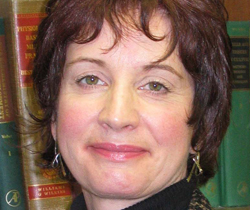 |
Paula Turpen, Ph.D. |
That’s the word from Pi-Wan Cheng, Ph.D., professor in the department of biochemistry and molecular biology and the Eppley Institute and one of UNMC’s top core facility users.
From off-hour usage policies that allow research to be done beyond the normal business hours to the vast technical knowledge of the core facility personnel, Dr. Cheng said UNMC does it right when it comes to core facilities.
“Their attitude of ‘working for the investigators’ has made UNMC a joyful place to conduct research,” he said.
Shared resources for UNMC investigators
Core facilities, sometimes called shared resources, provide sophisticated, expensive technology and expertise that no single lab would have the financial resources to purchase and learn.
These fee-for-service resources provide access to technologies, services and scientific consultation at a reasonable cost. The also allow for stability, reliability, cost-effectiveness and quality control that would be difficult to achieve otherwise.
NIH seeks UNMC input on core efficiency
Paula Turpen, Ph.D., UNMC’s research resources director, will speak about the operation of UNMC’s core facilities next week at a National Institutes of Health conference titled “Research Efficent Management and Utilization of Core Facilities.”
She was asked to speak at the conference after the NIH became aware of UNMC’s efficient operation and use of its core facilities. The conference will include attendees from universities such Yale, Penn, Cornell, Vanderbilt, Northwestern and Baylor.
Praise for Dr. Turpen
The NIH’s request for Dr. Turpen’s input is a direct reflection of the great work she has done with UNMC’s core facilities, said Tom Rosenquist, Ph.D., vice chancellor for research.
“This is an honor for UNMC and acknowledges the way that Dr. Turpen has brought a business-based efficiency and high level of user-friendly service to the UNMC research cores,” Dr. Rosenquist said. “Her leadership in this effort is supported by her having worked as a product development researcher in private industry for over 10 years, before she was recruited by UNMC.”
Why UNMC cores work so well
The efficiency of UNMC’s core facilities stems from well-defined criteria and expectations for operation, Dr. Turpen said. UNMC surveys the needs of the research community and tracks the activity and use of the research cores to adapt to the changing needs of the research community and help researchers remain competitive.
|
|
UNMC also benefits from the collaborative culture adopted by core directors, Dr. Turpen said, noting that this provides an opportunity for innovation of new technology, joint publications and even grant applications.
“It’s not uncommon at some institutions for a silo mentality to take hold at core facilities,” she said. “We are fortunate here that the opposite exists. Our facilities truly are open to anyone who needs them.”